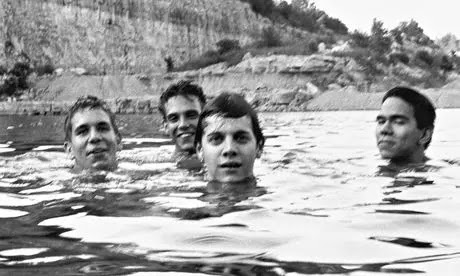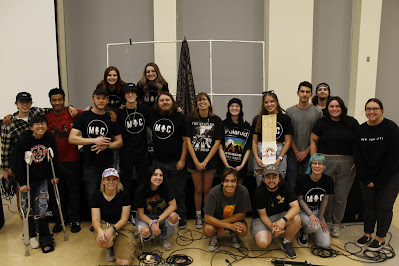Classic Album Review with Mitchell: Slint - Spiderland
Spiderland: A Swansong Unlike Any Other
As I was deciding how to open a review for my favorite album of all time, I found myself at a loss. I could talk about my first time listening to Spiderland. It was on the bus during my junior year, on my way to school, in the pouring rain. Perhaps I could open with a brief synopsis of the band behind this classic album, Slint. Maybe an important lyric that stands out to me? However, every time I started to write, I just knew that the first thing I wanted my readers to see is that picture. Yes, that picture. The album cover that any music buff could recognize from a mile away. Will Oldham, a long time friend of the band, agreed to accompany the guys to a quarry in Jefferson, Indiana to take pictures for a potential album cover. Amongst these photos, was the one we see here today, stylized in black and white for the official release. Hovering just above the water, the smiling faces of Todd, Brian, Britt, and David are caught in the midst of what seems to be a wonderful time together. In a way, it's symbolic of the joy that the band so desperately seeks throughout the album.
Slint released their first record, Tweez, under an independent label ran by their friend, Jennifer Hartman. Despite being engineered by Steve Albini of Big Black and Shellac, the album was unable to achieve the success that Slint had originally hoped. Former bassist, Ethan Buckler, left the band after the recording sessions, citing a "dissatisfaction" with the sound of the recordings. With that being said, they were able to catch the ear of Corey Rusk of Touch and Go Records, a label that would go on to release Spiderland. With the star-power of Steve Albini and their own talents, Tweez proved to be an impressive math and post rock debut for the group. Little did anybody know how pivotal of a stepping stone the sound of this album would be.
Slint found Todd Brashear, a bassist that was set to take the place of Ethan upon his departure. Along with this, vocalist, Brian McMahan, reached out to producer, Brian Paulson, to engineer the band's next album. Recording for Spiderland began in August of 1990 in a four-day session that was said to be grating, mentally exhausting, tiring, and almost painful. McMahan's depression was worsened by a car accident that had happened on his way to a recording session for another band in which he worked with Paulson as well. Guitarist, David Pajo, claimed that it was this mental anguish that made McMahan's performances on the album so powerful.
The album kicks off with Breadcrumb Trail. Immediately, you're transported to the mystical atmosphere of the twinkling guitar strums and arpeggios in that 7/4 riff. Brian narrates the story of a man that meets a fortune teller at a carnival. The soft-spoken vocals, barely audible, create a sense of reluctance that slowly eases itself into a sense of curiosity. The fortune teller's line is out the door, indicating that everybody wants their fortune read. The narrator steps in line, but when it's finally his turn, he asks her if she would like to go on a rollercoaster instead. Following this verse is an explosion of triumphant sounds, symbolizing the thrill of the climb to the top of the first hill. Brian's vocals are no longer soft. "Creeping up into the sky," he sings with intense emotion. As the music hits its climax, the fortune teller is experiencing the present, rather than seeking out the future. Breadcrumb Trail describes the exhilarating moments of life. The ones you cannot predict, but rather have to approach yourself. These are moments that don't come to you until you're right in the middle of them, filling you with gratitude for the wonders of this life you've been given. As the rollercoaster ride ends and the fortune teller is left aghast by the experience, the music calms down to the original riff and Brian's soft-spoken poetry returns. The narrator says goodnight to the blushing fortune teller. While she has returned to her calm state, it's apparent that she is forever changed.
The storytelling continues into the next song, Nosferatu Man. From the perspective of Dracula (yes, Dracula), Brian tells a tale of desire and intense yearning. Drumstick clicks and a ringing snare give off a menacing tone to the start of the song. A screeching guitar motif separates the stanzas of whispered lines. Dracula has sight of his next target. He is hungry, he is in love. Suddenly, he makes his attack as the distortion picks up and the vocals reach a high volume yet again. The contrast of volume in the vocals in this song is arguably done better than the last, with the softer registers being used to portray a gentle yet unsettling character, and the louder registers being used to portray the more passionate side of the same character. While the meaning of this track can be interpreted differently by listeners, I think that this is simply a story of lost love. A tale of a man who pursued much too hard. The first bite from Dracula pulls the girl into his embrace, yet the second was too much for her to handle, killing her. He mourns at the end of the song, "After that girl I'll keep alone. There's nothing left to save." The way this track describes the loss of love as grief resonates extremely well, especially when some of the following songs discuss this topic.
Don, Aman is the first song that is narrated from a third-person perspective. Ironically, I find that this is the most realistic and personal song from a storytelling perspective. Don can easily be symbolic of Brian's anxieties as an individual in social scenes. Interestingly enough, Britt Walford has a verse on this song, which furthers my suspicions that this song's story is the closest real-life comparison to the members of the band. "Don stepped outside," Brian whispers over the complete silence. A melancholic riff plays in a 9/4 meter followed by a 7/4 meter in the next measure. This creates a very off-putting 4/4 time signature that essentially simulates the anxiety that the character of Don is likely also feeling. He goes out to try and use the bathroom, keeping the chatter of a party out of his ears and giving himself some alone time to reflect and relax. Being too caught up in his own mind to even be able to pee, he decides to go in to socially redeem himself. He soon regrets this as the guitar switches to quick, frantic downstrokes. Brian begins to name off the little things that Don is fixating on. "The light. Their backs. Their conversation. The couples, romancing, so natural." This is yet another example of Slint masterfully using their music to fit the mood of these deeply personal lyrics. The anxiety builds, the distortion is amped up on the guitars to match this feeling. Unable to find a friend, being desensitized by sensory overload, Don decides it would be best if he left. The next morning, we hear the same riff from the beginning of the song. However, this time, the atmosphere is much darker as Don looks at himself in the mirror. "He knew what he had to do. He was responsible. In the mirror, he saw his friend," the vocalist narrates, leaving the listener on the eeriest of cliffhangers. Don has found that his only friend is himself. Finally, the distorted downstrokes swell before fading out into silence. This, in my opinion, is one of the darkest symbolisms of the album, perhaps being a reference to anything from a complete breakdown, an anxiety attack, or as the next song suggests, a suicide.
Washer. A song that is so much more than anything I could possibly do justice. After the recordings of Spiderland were finished, it was rumored that Brian McMahan checked himself into a mental hospital for his depression, which over the recording session had grown severe. Listening to a song like Washer will leave you in immense emotional anguish. The scary part is, it is only a fraction of what Brian had to have been going through at this time. Many fans speculate this song to be a suicide note. Whether or not it is sung from the perspective of an unnamed character or from Brian himself, I can thankfully say that he is still around as of when this comes out. This song is the most lyrically heart-crushing piece of music I have ever heard. While others may have left me feeling a little more sad or pitiful, Washer leaves me completely empty. Only a truly troubled genius can write a line as beautifully sorrowful as, "Fill your pockets with the dust and the memories, that rises from the shoes on my feet." Shoes that won't be filled ever again. Memories collected from all the places traveled. All left for Brian's love to try and grasp on to, even if it feels like trying to snatch a feather in the wind. And what more can I say about this song sonically other than the obvious? It personifies that emptiness that you would feel if you were just reading this note on a piece of paper. Perhaps this is enhanced by the fact that this song ditches the spoken-word portions of previous tracks and is entirely sung by Brian in a soft, brokenhearted whimper of a voice. It is nearly impossible for me to pick a favorite song on this album, but Washer is one of those songs that had taught me more about myself as a songwriter, a poet, a human being with emotions, than any teacher or textbook ever had.
For Dinner... is an instrumental track that, in my opinion, serves as the glue that holds the second half of this album together. Coming after Washer and before the explosive closer, Good Morning, Captain, I feel that it plays an important role in letting the listener soak in what they've just heard. The track features gradual crescendos all around the six-minute runtime. Each one is more riveting than the last. While every song before hand (and the song after) has that memorable moment that it eventually builds up to, For Dinner... leads the listener on, further building the sense of anxiety that is conveyed so well throughout the album. Sure, we get a few complete musical phrases throughout the piece, but overall this song is entirely uphill, never hitting a climax. I'd like to believe that this is because the closing track is a climax in itself.
A captain who has lost everything to the storm: his crewmates, his ship, his innocence. This is Good Morning, Captain, the final track of Spiderland and the last song that the band ever recorded before the band tore itself apart. The usual dark guitar tones, the amateurishly tuned drums, the nearly inaudible vocals, all make their return for the Slint's final outing. The story follows the captain, who following the loss of his ship and consciousness, finds himself in a state of yearning for the life he had before it all went tragically wrong. He finds himself in a house in which he sees a boy peeking at him. Upon seeing this boy, he is reminded of his own youth and asks him for help. The child seems reluctant to do so. It's at this moment where the captain, seemingly ashamed of himself that the child doesn't want to help, realizes he's lost his former self. The symbolism here is supposedly descriptive of the band's mourning of their childhood as they unwillingly accept that they are forced to move on. For Slint, they are unsure if this means that they will spend the rest of their days touring, away from family, from home, from the last piece of childhood they have to hold on to. As people, they are all separate individuals experiencing a shared grief, personified by this captain. The song builds up as the captain pleads harder and harder for the boy to help him. He begs, "I'm trying to find my way home. And I'm sorry. And I miss you. I miss you. I've grown taller now." I like to believe that the captain sees his young self so much in the boy that he begins to talk to the boy as if he were speaking to his young self. This explains the repeating mantra of "I miss you." As he continues to say this, the music grows in volume, in intensity, in emotion. Eventually, Brian is screaming at the top of his lungs, "I miss you," as the rest of the band plays with a certain emotion that you can visualize so clearly in your head that it moves you to tears. The last few roars of "I miss you," were not only the final lyrics of the album, but the last part that the band recorded. Just like that, Slint says goodbye to the listeners, and we have to say goodbye back, no matter how much we want them to stay, leaving us saying, "I miss you."
Spiderland holds a special place in my heart, not for what it has done for me, but what it has inspired me to do for myself. The boys of Slint were about my age at the time of recording this timeless album. The poetry, the storytelling, the musicality, the raw emotion. All of this came from minds as fresh as my own. When I listened to this album for the first time during that rainy spring morning on the school bus, I discovered the artist in me. The expression of mental illness, social anxieties, grief, mourning of youth, all through song is something that I carry with me like a locket in my mind. The articulate and masterful musicality coming from this sonically brilliant record is nothing short of a once-in-a-lifetime experience. There will never be another Spiderland. Not because of the riffs in odd time signatures, not because of the trademark inaudible vocals, not because of its interesting backstory. Other albums have that as well. It's the way that Slint was able to accomplish each of these aspects, as well as convey such personal, complex emotion in the record's sub 40-minute runtime that makes this a one-of-a-kind masterpiece. Though we may never see new material from Slint, this band will forever live on as the legendary act that was responsible for Spiderland, the ultimate benchmark of post rock to come.
Wrap-Up
I hope you all enjoyed my first official review. Go ahead and give Spiderland a listen in the link below! For those of you who are fans of New Music Roundup, the September issue will be coming up next week. The reception of the blog has been magnificent since the semester has started, so I'd like to thank all of you for your help and support. Until next time!
- Mitchell
Album Link: https://open.spotify.com/album/2NnkLRaeX33d1Mn8ZLgTo8?si=BOkpztDqQt6V6Tsf7E_ZpA
News
- New Blog Posts (every week on Wednesdays) Keep an eye out for some other surprise posts throughout the week.
- Open Mic (First Wednesday of every month, 8pm - 10pm) Come show us your skills! Musicians, poets, comics, artists and all, take a step on stage to display your talents in front of your BG peers.
Social Media
Get all your updates and information on the blog from any of these accounts below!
Music Industry Club
- Instagram: micbgsu
- Twitter: MICBGSU
Mitchell, Host
- Instagram: mitchellhxrley
- Twitter: hurley_mitchell
- Snapchat: mhurley.13









Comments
Post a Comment